John Cassidy's Blog, page 102
February 29, 2012
How Santorum Blew Michigan
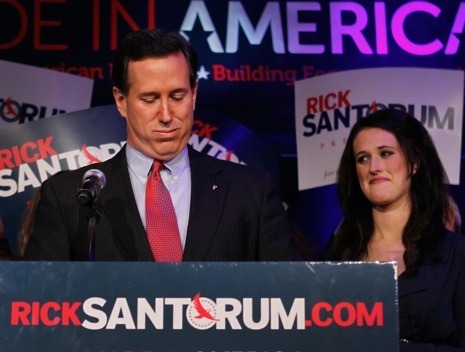
Since I mistakenly predicted a narrow victory for Rick Santorum in the Wolverine State, you will forgive me if I exercise a bit of proprietorial interest in why he ended up losing, albeit not by much.
One theory, which I trotted out in my overnight post, is that he ran into the limits of social conservatism. According to this view, a vote share of thirty-eight per cent is about the maximum he could expect to achieve in a state like Michigan, where most of the vote is concentrated in urban and suburban areas.
The more I look at the polling data, though, the more I think that Santorum, if he hadn't made some eminently avoidable blunders in the runup to yesterday's vote, could have snatched a narrow victory. His mystifying decision to attack the sacred memory of John F. Kennedy, his bizarre attack on college education, and his ham-fisted attempt to recruit Democratic voters to his cause may well have alienated enough of his potential supporters to have cost him the election.
To be sure, Santorum had no chance of running his vote up to the mid or high forties, as Romney managed to do in Arizona, but if he could have edged it up just a couple of more points, he would have won. As I pointed out in the post on Monday, several of the opinion polls showed things breaking in his favor over the weekend, when Romney was blundering around talking about his wife's two Caddies and his pals who owned NASCAR teams.
The network exit poll confirmed that Santorum had built up some late momentum. Among voters who made up their minds in the past few days, about a quarter of the electorate, he won handily: forty-three per cent to thirty-four per cent. But according to Karl Rove, who presumably had access to more granular data, among voters who decided in the final twenty-four hours the numbers were reversed: Romney won by eight points.
What turned late late deciders against Santorum? Rove's theory is that it was the news, widely reported on Sunday and Monday, that his campaign had been robo-calling Democrats and reminding them that Romney had come out against the auto bailout despite supporting the Wall Street bailout. Underhanded tactics are nothing new in this election—Santorum was quick to point out that Romney's campaign had employed robo-callers in other states—but the revelation enabled Romney to portray his rival as a vote-grubbing hypocrite. (Only a month ago, Romney said, "States should only allow Republicans to vote in Republican primaries.") Rove is probably right that this was enough to shift some voters into Mitt's lap.
Another thing working against Santorum was the gaffe he made on Saturday, when, during a speech promoting manufacturing jobs, he appeared to criticize the concept of college education. Referring to President Obama, Santorum said, "He wants everybody in America to go to college." And he went on: "What a snob…. He wants to remake you in his image. I want to create jobs so people can remake their children into their image, not his."
Santorum's speech was supposed to be about promoting manufacturing jobs. If he had confined himself to saying that not all good jobs require a college degree, and there are many worthwhile and socially useful professions that people without one can enter, he would have been on firm ground. By reverting to culture-war rhetoric, he placed himself in opposition to the views of the overwhelming majority of Americans—as evidenced in this article from Bloomberg News:
With the economy still struggling after emerging from a recession, more than two-thirds of U.S. adults view a college degree as essential for getting a good job, according to a Gallup Poll published in August. And 94 percent of parents with children under 18 expect them to go to college, said Paul Taylor, executive vice president at the Pew Research Center in Washington. "It's a near-universal aspiration," said Taylor.
The other big news over the weekend was Santorum's interview with George Stephanopoulos on ABC's "This Week," when he appeared to suggest that J.F.K.'s famous 1960 speech about the separation of church and state made him want to puke. Actually, what he said was more indirect. After Stephanopoulos brought up J.F.K.'s speech, Santorum said: "I don't believe in an America where the separation of church and state are absolute. The idea that the church can have no influence or no involvement in the operation of the state is absolutely antithetical to the objectives and vision of our country … to say that people of faith have no role in the public square? You bet that makes me want to throw up."
Strictly speaking, Santorum wasn't criticizing Kennedy: he was engaging in of his typical rants about the secularization of American politics. But two days before a crucial election, Presidential candidates can't expect the media to parse their words carefully. Within hours of his statement, the news was out: Santorum had attacked Kennedy. And it wasn't just the mainstream media that ran with the story: even Bill O'Reilly joined in. During his Fox News show on Monday, he contrasted Santorum's statement not just with Kennedy's but with the words of Ronald Reagan, who, in 1980, referred to Kennedy's avocation that his Catholicism wouldn't affect his Presidency as "just so, and proper."
"The problem for Rick Santorum is that he goes beyond defending people of faith, and that's getting him into trouble," O'Reilly told his viewers. And he went on: Santorum's "saying that some policy matters should be decided on what is considered right and wrong in the religious realm. That would lead to anarchy because Americans are very diverse in their belief systems."
When Bill O'Reilly is criticizing a conservative torchbearer on the night before an election, something has gone badly wrong in that candidate's campaign. And the most bizarre thing is that Santorum's outburst wasn't even necessary to secure his base. With Newt Gingrich not even competing in Michigan, he was assured of the votes of the evangelicals and other rural conservatives in the west and north of the state. To beat Romney, he had to pick up enough votes in the urban and suburban southeast of the state—in counties like Macomb, Monroe, Washtenaw, and Wayne.
Macomb, once a stronghold of Reagan Democrats, was particularly pivotal. An area that is still more than ninety-per-cent white, it is heavily inhabited by families of Irish, Italian, and Polish extraction—Catholic families that not very many years ago, and perhaps even now, had photographs of J.F.K. hanging in their parlors.
According to City-Data.com, fully seventy per cent of the inhabitants of Macomb County that have a religious affiliation are Catholics. In a contest between an Italian-American Catholic and a WASPish Mormon, the advantage should have been with Santorum. But rather than winning Macomb, he ended up trailing Romney there by a margin of almost nine points: 43.3 per cent to 34.6 per cent.
Can I prove that Santorum's criticism of Kennedy swayed some of these voters? No. But it certainly can't have helped. And since I need an excuse for getting things wrong, I'm going to seize upon it and wield it as more evidence that it wasn't me who screwed up: it was my dumb candidate. He could have won it. He should have won it. And he blew it!
Photograph by Joe Raedle/Getty Images.
MI Post-Mortem: Did Curse of the Kennedys Strike Santorum?

Having mistakenly predicted a narrow victory for Rick Santorum in the Wolverine State, you will forgive me if I exercise a bit of proprietorial interest in why he ended up losing, albeit not by much.
One theory, which I trotted out in my overnight post, is that he ran into the limits of social conservatism. According to this view, a vote share of thirty-eight per cent is about the maximum he could expect to achieve in a state like Michigan, where most of the vote is concentrated in urban and suburban areas.
The more I look at the polling data, though, the more I think that Santorum, if he hadn't made some eminently avoidable blunders in the runup to yesterday's vote, could have snatched a narrow victory. His mystifying decision to attack the sacred memory of John F. Kennedy, his bizarre attack on college education, and his ham-fisted attempt to recruit Democratic voters to his cause may well have alienated enough of his potential supporters to have cost him the election.
To be sure, Santorum had no chance of running his vote up to the mid or high forties, as Romney managed to do in Arizona, but if he could have edged it up just a couple of more points, he would have won. As I pointed out in the post on Monday, several of the opinion polls showed things breaking in his favor over the weekend, when Romney was blundering around talking about his wife's two Caddies and his pals who owned NASCAR teams.
The network exit poll confirmed that Santorum had built up some late momentum. Among voters who made up their minds in the past few days, about a quarter of the electorate, he won handily: forty-three per cent to thirty-four per cent. But according to Karl Rove, who presumably had access to more granular data, among voters who decided in the final twenty-four hours the numbers were reversed: Romney won by eight points.
What turned late late deciders against Santorum? Rove's theory is that it was the news, widely reported on Sunday and Monday, that his campaign had been robo-calling Democrats and reminding them that Romney had came out against the auto bailout despite supporting the Wall Street bailout. Underhanded tactics are nothing new in this election—Santorum was quick to point out that Romney's campaign had employed robo-callers in other states—but the revelation enabled Romney to portray his rival as a vote-grubbing hypocrite. (Only a month ago, Romney said, "States should only allow Republicans to vote in Republican primaries.") Rove is probably right that this was enough to shift some voters into Mitt's lap.
Another thing working against Santorum was the gaffe he made on Saturday, when, during a speech promoting manufacturing jobs, he appeared to criticize the concept of college education. Referring to President Obama, Santorum said, "He wants everybody in America to go to college." And he went on: "What a snob…. He wants to remake you in his image. I want to create jobs so people can remake their children into their image, not his."
Santorum's speech was supposed to be about promoting manufacturing jobs. If he had confined himself to saying that not all good jobs require a college degree, and there are many worthwhile and socially useful professions that people without one can enter, he would have been on firm ground. By reverting to culture-war rhetoric, he place himself in opposition to the views of the overwhelming majority of Americans—as evidenced in this article from Bloomberg News:
With the economy still struggling after emerging from a recession, more than two-thirds of U.S. adults view a college degree as essential for getting a good job, according to a Gallup Poll published in August. And 94 percent of parents with children under 18 expect them to go to college, said Paul Taylor, executive vice president at the Pew Research Center in Washington. "It's a near-universal aspiration," said Taylor.
The other big news over the weekend was Santorum's interview with George Stephanopoulos on ABC's "This Week," when he appeared to suggest that J.F.K.'s famous 1960 speech about the separation of church and state made him want to puke. Actually, what he said was more indirect. After Stephanopoulos brought up J.F.K.'s speech, Santorum said: "I don't believe in an America where the separation of church and state are absolute. The idea that the church can have no influence or no involvement in the operation of the state is absolutely antithetical to the objectives and vision of our country … to say that people of faith have no role in the public square? You bet that makes me want to throw up."
Strictly speaking, Santorum wasn't criticizing Kennedy directly: he was engaging in of his typical rants about the secularization of American politics. But two days before a crucial election, Presidential candidates can't expect the media to parse their words carefully. Within hours of his statement, the news was out: Santorum had attacked Kennedy. And it wasn't just the mainstream media that ran with the story: even Bill O'Reilly joined in. During his Fox News show on Monday, he contrasted Santorum's statement not just with Kennedy's but with the words of Ronald Reagan, who, in 1980, referred to Kennedy's avocation that his Catholicism wouldn't affect his Presidency as "just so, and proper."
"The problem for Rick Santorum is that he goes beyond defending people of faith, and that's getting him into trouble," O'Reilly told his viewers. And he went on: Santorum's "saying that some policy matters should be decided on what is considered right and wrong in the religious realm. That would lead to anarchy because Americans are very diverse in their belief systems."
When Bill O'Reilly is criticizing a conservative torchbearer on the night before an election, something has gone badly wrong in that candidate's campaign. And the most bizarre thing is that Santorum's outburst wasn't even necessary to secure his base. With Newt Gingrich not even competing in Michigan, he was assured of the votes of the evangelicals and other rural conservatives in the west and north of the state. To beat Romney, he had to pick up enough votes in the urban and suburban southeast of the state—in counties like Macomb, Monroe, Washtenaw, and Wayne.
Macomb, once a stronghold of Reagan Democrats, was particularly pivotal. An area that is still more than ninety-per-cent white, it is heavily inhabited by families of Irish, Italian, and Polish extraction—Catholic families that not very many years ago, and perhaps even now, had photographs of J.F.K. hanging in their parlors.
According to City-Data.com, fully seventy per cent of the inhabitants of Macomb County that have a religious affiliation are Catholics. In a contest between an Italian-American Catholic and a WASPish Mormon, the advantage should have been with Santorum. But rather than winning Macomb, he ended up trailing Romney there by a margin of almost nine points: 43.3 per cent to 34.6 per cent.
Can I prove that Santorum's criticism of Kennedy swayed some of these voters? Of course I can't. But it certainly can't have helped. And since I need an excuse for getting things wrong, I'm going to seize upon it and wield it as more evidence that it wasn't me who screwed up: it was my dumb candidate. He could have won it. He should have won it. And he blew it!
Photograph by Joe Raedle/Getty Images.
February 28, 2012
Romney Has Big Night; So Does Obama
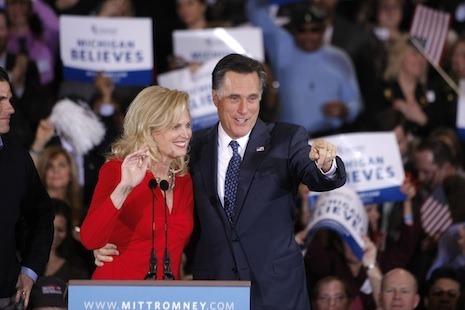
Fair dinkum: it was Mitt Romney's day, and he deserves some credit. For the second time in a month—the first time was after he lost South Carolina—he held his nerve and clawed his way out of trouble. For a politician who often comes across as an out-of-touch rich weenie, he has shown an ability to take some blows that will serve him well later on. But after saying all that, I can't help but thinking that the real beneficiary of what happened yesterday was Barack Obama.
First, though, the Mittster. After two weeks in which it looked like his campaign might implode in his native state, he scored two big victories, heading off Rick Santorum's underdog challenge in Michigan and winning easily in Arizona. "We didn't win by a lot, but we won by enough, and that's all that counts," he said shortly after the networks had projected him as the winner in Michigan.
As someone who had rashly, if somewhat lightheartedly, tipped a Santorum victory, I can readily acknowledge the essential truth of his statement, even if the proportional allocation of delegates in Michigan renders it strictly inaccurate. Flanked by his wife and other family members, Romney looked mightily relieved, and somewhat sobered by what he had been through. No wonder. If he had lost in Michigan, there was a real possibility that a new and less damaged figure would enter the race and unite the Republican Party behind him: a Jeb Bush or a Chris Christie, say.
For the White House as well as Romney, this was a serious danger, if only because its consequences would have been unknowable. The results of yesterday's primaries effectively ruled it out. Today, it is virtually certain that the Republicans will be saddled with a battered candidate whose approval rating with independents has plummeted almost twenty percentage points over the past couple of months (Romney) or, less likely but still not completely out of the question, with a surefire loser (Santorum).
If Romney isn't quite restored to his position as "Mr. Inevitable," he's "Mr. Very, Very Likely." But with Super Tuesday only days away, it is difficult to see how he can change the underlying dynamic of the race, which is slowly but surely dragging him down. What he really needs is an early end to the primary contest, but of that there is still no sight. His victory in Michigan was narrow enough—with 98 per cent of the vote counted, he was leading by 41.1 per cent to 37.9 per cent—for Santorum to harbor hopes of beating him in Ohio, the biggest prize next week. Even if Romney scrapes home in the Buckeye State, he will probably suffer some big losses in southern states like Georgia. (It emerged yesterday that Sheldon Adelson is sending yet another big check to Newt Gingrich's Super PAC.)
The good news for Romney is that Santorum's bubble has burst. (And not before time, I hear many of you saying.) While he performed pretty well yesterday in Michigan, especially in rural areas, he encountered the limits of a campaign based almost exclusively on social conservatism: suburban voters, the type who decide elections, shied away from him. In Macomb County, the ancestral home of the "Reagan Democrats," Romney topped him by nearly nine points—43.3 per cent to 34.6 per cent. In Arizona, which is also a suburban state, Romney ran ahead of Santorum among seniors, conservatives, and Tea Party supporters alike, according to an exit poll. Romney also carried the Catholic vote.
Even in today's Republican Party, it appears, you can't become a Presidential candidate by promising to return the United States to the precepts of the Roman Catholic Church pre the Second Vatican Council. Santorum, who isn't quite as dim and reactionary as he sometimes sounds, finally seems to accept that this is 2012 rather than 1912. In his consolation speech, he eschewed attacks on contraception, John F. Kennedy, and college education, in favor of speaking about his mother Catherine, a hardworking nurse who obtained a graduate degree. (For some reason, he didn't mention his father who is a clinical psychologist with a Ph.D.) Then he moved onto the economy, an area where has some unorthodox, if not particularly well thought through, things to say.
It looks like he's missed his chance, though, slim as it was. While he was holding up a piece of North Dakota sand shale, which he said contained some excellent light sweet crude that the Obama administration is preventing the country from exploiting, CNN cut away from him to project Romney as the winner—a rare moment of drama in a night that was a bit of an anti-climax.
Around nine o'clock in the East, Romney took a narrow lead in the precincts that had reported, and he held onto it all night. At about 9:05, the betting markets decided Romney had it in the bag: on Intrade, the implied probability of him winning jumped from sixty per cent to eighty five per cent. About fifteen minutes later, on Fox News, Karl Rove, citing early returns from the big populous counties around Detroit, called the race for Romney. Joe Trippi, his Democratic sidekick, seconded the call.
Romney's focus on pocketbook issues had paid off, just as it did in Florida. The network exit poll showed fifty-four per cent of Michigan voters cited the economy as their biggest concern, compared to just fourteen per cent who cited abortion. In the former group, Romney won by sixteen points: forty-five per cent to twenty-nine per cent. Pretty much the same thing happened in Arizona, where forty-eight per cent of voters cited the economy as their primary concern, and among these voters Romney led Santorum by sixteen points. (With more than eighty percent of the vote counted, his overall margin of victory in Arizona was an impressive twenty points: forty-seven per cent to twenty-seven per cent.)
Perhaps the biggest surprise was that the "sabotage Mitt" movement on the part of Democrats voting for Santorum failed to materialize, at least in a big way. In what was an open primary, the exit polls showed that about ten per cent of the voters were Democrats, not much different from the figure in the 2008 GOP primary and quite a bit lower than the 2000 contest, when many non-Republicans voted for John McCain against George W. Bush. Evidently, the thought of pulling the lever for Santorum, albeit in a good cause, was more than many Democrats could stomach.
That's an understandable attitude. Ultimately, as I said up top, it will probably work out to the benefit of the Democrats and Obama. Two months into this primary season, with eleven states having gone to the polls, the Republicans are still busy tearing themselves apart. In the short run, anyway, nothing that happened yesterday will change that.
Photo by Bill Pugliano/Getty Images.
February 27, 2012
Michigan Call: Santorum in a Squeaker
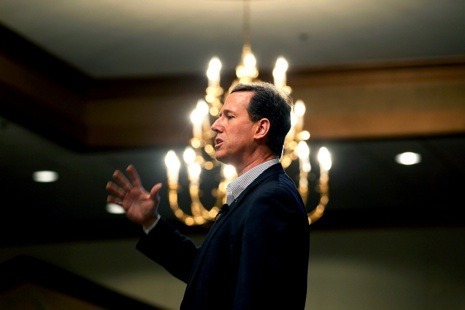
With less than a day to go, the crucial Michigan primary still looks very close. Three out of four new polls show Romney with a narrow lead over Santorum. Statistically speaking, however, the two candidates are virtually tied. After Romney's resurgence last week, most pollsters and forecasters are still predicting he will win. But I am going against the trend and predicting that Santorum will squeak out another surprise victory.
The argument for Romney is straightforward and conventional. In the past week, or so, almost all the polls—local and national—have swung in his favor. Plus, he's got the better field operation, and he's so desperate to win that he and his Super PAC will be pouring in every dollar and body that they can until the polls close.
The Real Clear Politics poll-of-polls now shows Romney ahead by one and a half points—37.3 to 35.8. Of all the surveys taken since last Wednesday's debate, he has been leading in all but one of them. The four newest polls are all based on questioning carried out yesterday, which means they should have picked up any last-minute swings. Two of them, from Rasmussen and PPP, show Romney leading by two points; another, from WeAskAmerica, gives him a four-point lead. The last survey, from Mitchell/Rosetta Stone, shows Santorum up by two.
On this basis, the betting sites are still making Romney a strong favorite. At 12:30 P.M. E.T. today, on Intrade the implied probability of him winning was sixty-eight per cent. At Betfair, it was seventy-four per cent. Many polling experts, such as Nate Silver, are also predicting a Romney victory.
So why am I going for Santorum? Four things:
1) There is tentative evidence in the new polls that Romney's surge may have peaked. First take Rasmussen. Its previous poll, conducted last Thursday, showed Mitt with a six-point lead: forty to thirty-four. Now his lead is down to thirty-eight to thirty-six. Next take Mitchell/Rosetta Stone. On Thursday, its poll (pdf) showed Romney leading thirty-six to thirty-three. Today, the same firm has Santorum ahead thirty-seven to thirty-five.
Yes, I realize that these change probably aren't statistically significant, but the samples are so small, and the numbers are so close, that you can say that about virtually all the data. Either you toss them all out and say it's too close to call, or you try to make sense of the trends. Since this is a G.O.P. primary rather than a clinical test of a new cancer treatment, I prefer to take the latter, more speculative, route.
2) In several of the previous primaries, the polls have underestimated Santorum's strength. It happened in Iowa. And it happened again in Colorado and Minnesota. Michigan is bigger and more urban than any of those states, which might suggest caution in making direct comparisons—the polls in Florida didn't underestimate Santorum's support—but I still think it might be worth a point or two in Santorum's favor.
3) The "sabotage Mitt" factor. Michigan is an open primary, where anybody can register as a Republican for the day and vote. It's also a strong union state. I can imagine many union members wanting to vote against Romney both for personal reasons (his job-slashing tactics at Bain Capital and his opposition to the auto bailout) and to saddle the Republicans with an unelectable candidate: Santorum.
4) Wishful thinking. If Romney loses, it's a much better story, with renewed talk of a Jeb Bush/Chris Christie entry, a brokered convention, and who knows what else.
So, there you have it. As a proud graduate of St. Thomas Aquinas Grammar School, I'm going for my fellow Papist. In the end, he might not quite get his nose ahead tomorrow, but at odds of close to three to one on Betfair, he's definitely the best betting value.
Photograph by Joe Raedle/Getty.
February 24, 2012
Romney's New Tax Plan: Big, Bold, and Desperate
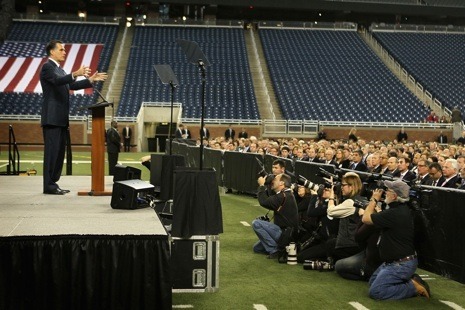
This is the first rule of Republican politics: If you are in trouble, promise to cut taxes. The second rule is similar: If you are in trouble and you have already promised to cut taxes, say you will cut them even more.
Speaking to what may have been the smallest crowd in the history of Ford Field, the home of the Detroit Lions, Mitt Romney today followed the second rule. Revising the fifty-nine-point economic plan he unveiled last September, which proved about as inspiring as an old C-SPAN tape, the Mittster promised to slash income-tax rates by a fifth. Under his new proposal, the top rate of thirty-five per cent would be slashed to twenty-eight per cent; the second top rate of thirty-three percent would be cut to twenty-six percent; and so on down to the bottom rate of ten per cent, which would be reduced to eight per cent.
Channelling Ronald Reagan, Arthur Laffer, George W. Bush, and other patron saints of supply-side economics, Romney declared, "By reducing the tax on the next dollar of income earned by all taxpayers, we will encourage hard work, risk-taking, and productivity by allowing Americans to keep more of what they earn."
Romney didn't completely junk his old plan, in which he had pledged to cut the tax rate on corporate profits from thirty-five per cent to twenty-five per cent, abolish the inheritance tax, and maintain Bush's fifteen-per-cent rate on capital gains and dividends—and abolish it completely for people who earn less than two hundred and fifty thousand dollars a year. All these costly giveaways hold over to his new plan, where they have been supplemented with an across-the-board proposal to slash income taxes.
If you recall some of your grade-school arithmetic classes, where adding two negative numbers together gave you a larger negative number, you might suspect that cutting taxes for workers, businesses, investors, and dead people would produce a bigger gap between revenues and spending. This is the arithmetic that non-partisan budget experts are using when they estimate that Romney's tax proposals would cost the U.S. Treasury somewhere between $4 trillion and $6 trillion over the next decade. But it's also a misleading and unreliable type of arithmetic—according to Romney, anyway. "These changes will not add to the deficits," he said with an impressively straight face. "Stronger economic growth, spending cuts, and base broadening will offset the reductions."
The first part of Romney's new arithmetic relies on the familiar supply-side argument that cutting taxes encourages people to work harder and save more, which boosts economic growth, which generates higher tax revenues. These things can sometimes happen, but almost never to the extent that Republicans claim. In the absence of detailed projections—his campaign hasn't supplied any—it isn't clear how far Romney is exaggerating the impact on growth and revenues of his proposals, but the gap between plan and reality is probably considerable.
Some of Romney's spending proposals are reasonable. He wants gradually to increase the eligibility age for Medicare and Social Security, and to trim the benefits that upper-income retirees receive. Over the long run, these measures could have a big impact on the deficit. But the chances of them getting through Congress are slim to none. And even if Congress did somehow summon the will to defy the A.A.R.P., the reforms to Social Security and Medicaid wouldn't have much immediate impact, which means Romney has had to look elsewhere in his desire to limit federal spending to twenty per cent of G.D.P. by 2016.
As of today, federal spending is running at more than twenty-four per cent of G.D.P. To get that figure down, Romney is proposing to abolish some federal programs, such as Obamacare; slash others, such as Medicaid and Amtrak; and cut the wages of federal employees. Here, too, though, he hasn't provided any detailed projections.
Finally, there is "base broadening." This is the Washington jargon for eliminating tax breaks, such as the mortgage interest deduction, the deduction for charitable giving, and the deduction employers get for providing medical insurance. If Romney were indeed serious about eliminating all of these tax breaks, it might well be possible for him to trim tax rates without raising the deficit. But, of course, he isn't serious.
In his speech today, he said, "Middle-income Americans"—i.e., most taxpayers—"will continue to enjoy tax benefits that favor important priorities, including home ownership, charitable giving, health care, and savings." The trimming or elimination of tax breaks will be confined to "higher-income Americans. Those who receive the greatest benefit from rate cuts will see the most significant limits." This suggestion adds a welcome element of progressivity to Romney's plan, although overall I would guess it remains pretty regressive. But allowing most Americans to keep their tax deductions severely limits the amount of revenues that could be raised through this type of reform.
Simply put, you can't give the entire country a big tax break and pay for it simply by taking a few goodies away from the very rich. Romney's economic team, which includes Columbia's Glenn Hubbard and Harvard's Greg Mankiw, knows this perfectly well. To put the best possible face on it, the new Romney plan represents his opening gambit in the renewed debate, which the Simpson-Bowles commission sparked, about how to simplify the tax system—flattening marginal rates while raising the same amount of revenue, or even more.
At this stage in a Presidential campaign, however, politics trumps economics. Neither Romney nor anybody else (President Obama included) wants to tell ordinary American families that a couple of years from now they might no longer be allowed to deduct all of their mortgage interest payments, or their charitable donations, from their taxes. Hence the carefully targeted nature of Romney's proposals.
Taken overall, though, his new plan goes well beyond tactical positioning. In promising yet another big round of tax cuts while simultaneously trying to depict the President as a feckless fiscal degenerate, someone who couldn't balance his own checkbook, let alone the federal budget, Romney doesn't merely come across as irresponsible. He looks desperate.
Photograph by Scott Olson/Getty.
Good News! Michigan G.O.P. Turns on "Pinko" Rick
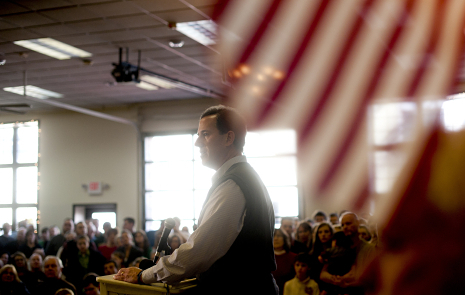
There's nothing like a few days in the mountains to get perspective on things and recall old truths. Much of what passes for electoral politics in this country is a farce. And the serious bits—the way the system fails to tackle things like joblessness, Third World levels of inequality and incarceration, a looming entitlements crisis, stagnant wages, and increasingly decrepit public infrastructure—are often too depressing and complicated to write about, especially online.
So, let's get back to the farce.
While I was away, Rick Santorum's lead in Michigan appears to have collapsed because he isn't conservative enough. Yes, that's right. All this time, Santorum has been posing as a one-man reincarnation of Ronald Reagan, Pope Pius X, and Dr. Strangelove, and it turns out he's actually a shameless pinko who's been doing the bidding of liberal groups like Planned Parenthood.
We can all thank Mitt Romney's well-funded opposition-research team for digging up this and many other pertinent facts that the Mittster brought to our attention during Wednesday's debate. The coup de grace was the stunning revelation that back in 2004 Santorum endorsed Arlen Specter, his fellow senator from Pennsylvania, who six years later went on to record the decisive sixtieth vote in favor of President Obama's health-care reform bill. (By that point, Specter had switched parties.)
To be sure, Specter had been a loyal Republican since 1965, when he ran for D.A. in Philly. But his opponent back in the 2004 G.O.P. primary was Pat Toomey, a former Wall Street trader and right-wing visionary who never saw a regulation or tax he didn't want to cut, and who would never have countenanced supporting an abomination like Obamacare—so there was no justification for Santorum's endorsement. Anybody who did anything, however indirectly, that contributed to saddling the country with health-care reform explicitly modeled on Romney's policies in Massachusetts, which in turn were based on a 1992 proposal from the Heritage Foundation, is far too left wing to be a credible G.O.P. candidate for President.
Michigan Republicans are cottoning on. Two new polls from the Wolverine State show Mitt with a narrow lead. "Romney has made big inroads with conservatives over the past ten days: Santorum's sixteen per cent lead among Tea Party voters has been erased and he is now tied with them; his sixteen per cent lead with evangelical Christians has now been cut in half to eight per cent, and Santorum's thirty-one per cent lead with self-identified conservatives has now been cut to thirteen per cent," said Steve Mitchell, president of Mitchell Research & Communications, Inc, one of the firms responsible for the new polling data. "Romney had to persuade fiscal and social conservatives that he was more conservative than they thought he was. He also had to persuade them that Santorum was not as conservative as Santorum said he was. Romney seems to be accomplishing both these tasks."
Thank goodness for that.
Photograph by Jeff Swensen/The New York Times.
February 22, 2012
Crunch Time for the Mittster
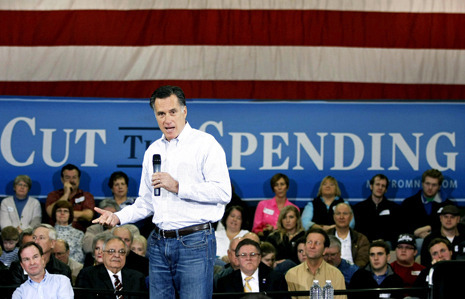
In which the author puts on his Republican consultant's tie, serves up some unsolicited advice to the former front-runner, and notes that, if any of this should prove useful, his Swiss bank account number is available upon request.
Dear Mitt,
This is it.
After running for the Presidency for almost six years, it comes down to this. If you don't turn things around in Michigan over the next few days, chance are you'll never make it to the Oval Office, or even to Tampa. All those Washington bigshots who've been acting nice to you over the past few months—they'll be out of here like rats scurrying from a burning building.
Let's be honest: we've known from the start that your support is soft. Today's G.O.P. was never going to embrace a former governor of Massachusetts who supported gay rights and access to abortion, and who introduced the principle of universal health care to the United States. Our entire campaign has been based on persuading the Republican grass roots to take you on sufferance as the man who can create jobs and beat Obama.
Lord knows the economy hasn't been doing us any favors. With unemployment falling by the month, and the Dow hitting thirteen thousand, one of our high trumps has already been taken away from us. Now comes this! If you can't win the state you grew up in, the state where your Pop, God rest his soul, was the governor, the electability argument will be gone, too. And without that, you can't win.
That's the bad news.
The good news is that you're not finished yet—not by a long way. You're a better campaigner than many of the talking heads are giving you credit for, especially when your back is against the wall. And Santorum is still Santorum: the guy who lost his home state by eighteen points in 2006. He didn't turn into Ronald Reagan overnight. Plus, we've got the money, which is just about to hit him.
The national polls are looking pretty dismal, to be sure, but that's largely because Santorum is getting so much free media. For more than a week now, he's been the big story. In Michigan, things aren't as bleak for us as some reports are saying. It looks like the poll from a week ago that showed Santorum leading by fifteen was a rogue. More recent polls show it's pretty close. My guess is that, six days out, you and he are running about level.
That isn't so bad. Iowa, South Carolina, and Florida showed that what really matters is who's got the momentum going into the final weekend. That's why tonight's debate is so crucial. For the first time since Colorado, Minnesota, and Missouri, it gives you the chance to swing the narrative away from Santorum. Now you're the underdog, and he's the one with the high expectations.
If you can turn this thing around, and I think you can, we can come roaring out of Michigan and Arizona as "The Comeback Kid"—our friend Bill Schuette, the Michigan Attorney General, is already calling you that—then do better than expected on Super Tuesday, although we'd probably still take a few knocks in the South, and move on. The rumors about Rove and Malek parachuting Jeb Bush or Chris Christie into the race will go away, and you'll be in great shape. The God Squad and Teabaggers are never going to love us, but once it's you versus Obama instead of you versus Gingrich, or you versus Santorum, they'll fall in line. (What choice do they have?)
That's the big picture. Now a few pointers for tonight's debate:
Go easy on trying to persuade people you're an authentic conservative. It's lipstick on a pig. The folks out there aren't stupid. (Well, some of them are, but even they don't like to be taken for fools.) Better to say something like: "Of course I'm not a movement conservative. I'm not a movement moderate, or a movement anything. I'm a businessman—someone who gets things done. But I've got conservative instincts, I come from a devoutly religious background, and I can promise you that if I make it to the Oval Office I won't disappoint you: I'll slim down the government, hold the line on taxes, appoint conservative judges, build up America's armed forces, and do all I can to restore old-fashioned American values."
Criticizing Santorum is good. When you went after Newt in Florida, it made you look tough and Presidential. But be a bit careful. Santorum isn't Gingrich. Our argument isn't that he's a crazy, unreliable, and corrupt megalomaniac: it's that he could never be President. Leave the rough stuff to the Super PAC. It'll be all over the airwaves saying Santorum's a phony—a sellout corporate lobbyist who has spent so long in Washington hanging out with rich lobbyists he'd barely know his way back to that steel town he comes from.
As I just said, our line on Santorum is that he's not a leader—he's never run anything—and he can't win. Your job is to point this out and get him rattled. So far, he's kept his calm pretty well, but we all know he's got a temper. So hit him with specifics, and make sure you get them right. Whatever you do, don't bring up that goddamn polar-bear exhibit at the Pittsburgh Zoo that he put in an earmark for. People love polar bears!
Keep working in the Mormon angle—it's a good counter to Santorum's story that he's got a direct line to Jesus Christ. When you said yesterday that your religious background means you know all about the importance of religious tolerance and religious freedom, and that if you become President you'd make sure the federal government never again attacks them, it worked really well. Sure, some of the Evangelicals won't like being reminded you're a Mormon, but they don't vote for you anyway. For everybody else, it's a reminder that you are a religious family man. That's all to your benefit.
Stop giving the impression you were in favor of letting G.M. and Chrysler go bust. The average Republican voter doesn't know what "managed bankruptcy" means. He thinks you wanted to bail out your slimy pals at Goldman Sachs and let the hard-working folks in the heartland go to hell. If you have to say anything, say you supported a private-sector auto bailout. People won't know what that means either, but it sounds better.
Loosen up a bit, and think back to the debates in September, October, and November. Back then, you came across as smart, well informed, and relaxed—Presidential even. Sure, the stakes are higher now, but it's still the same game, and you know how to play it.
Go get 'em, tiger. This time next week, you'll be Mr. Inevitable again. I just know it.
Your old pal,
J.C.
Photograph: Bill Pugliano/Getty
February 20, 2012
Did Santorum Really Suggest Obama Isn't a Christian?
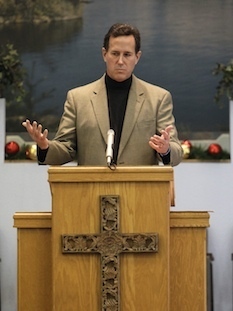
At the risk of repeating myself, Rick Santorum isn't a serious contender for the Presidency (though he is a serious candidate for the Republican nomination). He's a right-wing protest candidate—a religious extremist, a militarist scaremonger, and a peddler of very many views that would prove poison in a Presidential race. The latest: his suggestion in a campaign appearance on Saturday that the federal and state governments should get out of the business of running public schools.
Like other Republican candidates, Santorum is trying to give the impression that the country's current President, a man with a Muslim-sounding name, is leading the United States in a direction alien to its history and values. Part of this strategy involves accusing the Obama Administration, through its health-care reforms and other policies, of prosecuting what Newt Gingrich termed "a war on religion." Santorum, during the recent flap over contraception, health insurance, and the Roman Catholic Church, accused the Obama Administration and its supporters of "taking faith and crushing it."
The Republican depiction of the Administration's policies towards organized religion is distorted and reprehensible. In some ways it is redolent of the rabble-rousing tactics employed by right-wing agitators of the past, such as Father Coughlin and Joseph McCarthy. Still, in the interest of maintaining some standards and detachment, let's be clear about what Santorum said and didn't say.
If you've been casually following the news and the blogs over the past couple of days, you may well be of the understanding that Santorum has publicly questioned the President's Christianity. That's what Obama's reelection campaign would have you believe. "If you make comments like that, you make comments that are well over the line," Robert Gibbs, a campaign adviser to Obama, told Jake Tapper, on ABC's "This Week." And Gibbs went on: "It is time in our politics…(to)…get rid of this mindset that if we disagree, we have to disqualify each other, not just on political positions, but we question character and faith."
What did Santorum actually say? Appearing at a Christian Alliance meeting in Ohio on Saturday, he brought up the President's energy agenda, which involves encouraging the development of cleaner sources of power, and attempted to link him to a radical environmentalist worldview. Here's what Santorum said, as taken from a report by NBC News: "It's"—the President's energy agenda—"not about you, it's not about your quality of life, it's not about your jobs. It's about some phony ideal, some phony theology—not a theology based on the Bible but a different theology, no less a theology."
In common with many of Santorum's statements, this one was a bit garbled, and it didn't have much connection to reality. Serious environmentalists have been as disappointed with Obama's modest record as the rest of the left has. But it's pretty clear from Santorum's words that he wasn't querying the President's personal commitment to Christianity. To me, anyway, it looks like he was suggesting that environmentalism has turned into a quasi-religious theology, which the Obama Administration's energy policies reflect. On the right wing of the Republican Party, this isn't an uncommon view. In fact, it is the conventional wisdom among economic conservatives and social conservatives alike.
Shortly after Santorum's remarks, Ben LaBolt, the press secretary of Obama's reelection campaign, said they represented a "new low" in the Republican primary campaign. Asked about this at a press conference later in the day, Santorum muddied the waters by changing the subject to the Administration's handling of the contraception row. Here is an account by Felicia Sonmez, of the Washington Post:
"It is a new low," he told reporters. "The President has reached a new low in this country's history of oppressing religious freedom that we have never seen before. And if he doesn't want to call his imposition of his values a theology, that's fine. But it is an imposition of his values over a Church who has very clear theological reasons for opposing what the Obama Administration is forcing on them."
Asked whether he believes Obama is "less of a Christian" because of his position on the issue, Santorum responded, "No one's suggesting that."
"I'm suggesting — well, obviously, as we all know in the Christian Church, there are a lot of different stripes of Christianity," he said. "I'm just saying he's imposing his values on the Church, and I think that's wrong…If the President says he's a Christian, he's a Christian."
On Sunday morning, when Santorum appeared on CBS's "Face the Nation," a fired-up Bob Schieffer confronted him about his original remarks, saying, "Senator, what in the world were you talking about?" To which Santorum replied: "Radical environmentalism...this idea that man is here to serve the earth rather than to husband and steward the earth's resources."
Schieffer wasn't buying this, but I don't think Santorum was being evasive. He is a politician who employs a foghorn rather than a dog whistle. If he wants to accuse the President of something, he goes ahead and does it. (A couple of weeks ago, he said Obama was leading the country down the road to the guillotine.) When Schieffer pressed Santorum, saying he must have known that using phrases like "phony theology" would be taken as doubting the President's religious beliefs, he replied:
"I wasn't suggesting the President's not a Christian. I accept the fact that the President's a Christian. I just said that when you have a worldview that elevates the earth above man, and says we can't take those resources because we are going to harm the earth, this is just all an attempt to centralize power and give more power to the government. It's not questioning the President's beliefs in Christianity. I'm talking about his the belief that man should be in charge of the earth, should have dominion over it, and should be good stewards over it."
So, there you have it. Santorum acknowledges that the President is a Christian. He also believes the President is trying to impose secular values on the Church and on the country at large as part of a project to centralize power in the federal government.
Personally, I wouldn't be at all surprised if Santorum's true beliefs go further than this. To a Roman Catholic of his fundamentalist stripe, taking a liberal stance towards abortion, such as the one that Obama has adopted, is a mortal sin incompatible with being a true Christian. From the perspective of Santorum's wing of the Catholic Church, people who support liberal abortion laws and call themselves Christians are deluding themselves, or worse. I strongly suspect this is Santorum's opinion of Obama. But if it is, he hasn't said it publicly. Until and unless he does, it might be a good idea to exercise a bit of caution in parsing his comments.
Photograph by Charlie Neibergall/AP Photo.
February 16, 2012
Handicapping the World Bank Job
The confirmation that Robert Zoellick will soon be stepping down as chairman of the World Bank has ignited a lot of speculation about the identity of his successor. Foreign governments and N.G.O.s are calling for the appointment of a non-American, which would be a big break with tradition. For Bank employees and proprietors of five-star restaurants and hotels in developing countries who may be on tenterhooks waiting for the choice to be made, here is a quick handicapping sheet. (As that crack about the spending habits of senior Bank staffers indicates, it isn't meant to be wholly serious.)
Timothy Geithner: Odds, 7/4 favorite
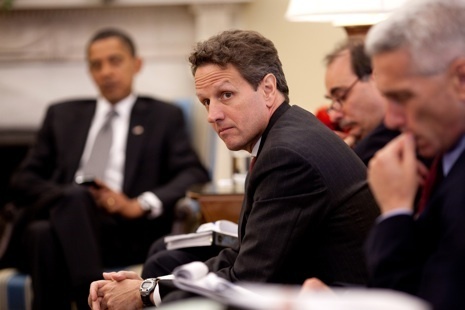
Pros: Having already said he is leaving the Obama Administration after the election, he needs a new job. His father worked for the Ford Foundation in Asia, so he is familiar with foreign countries and development issues. Taking a post in Washington would enable him to keep up with his buddy and fellow believer in "no drama," Barack.
Cons: Has promised his family he is returning to New York. Said to get a bit bored by worthy but tortuous issues like "microfinance." Since many people already think he used to work at Goldman Sachs, he might as well take a job there, or somewhere similar, and pocket some big bucks.
Hillary Clinton: Odds, 3/1 second favorite

Pros: As the first woman to head the World Bank, she could form a female Committee to Run the World with Christine Lagarde, the head of the International Monetary Fund. Having spent four years as Secretary of State, she probably already knows where Gabon and Equatorial Guinea are located. Could take advice from husband Bill, whose Clinton Global Initiative is heavily involved in development issues.
Cons: Has repeatedly said she doesn't want the job. Her last economics-related assignment—overseeing the Clinton Administration's health-care-reform plan in 1992-93—wasn't an unqualified success. Having had her own plane for four years, might balk at flying commercial.
Lawrence Summers: Odds, 10/1
Pros: As a former chief economist at the Bank, knows plenty about development issues and how the institution works. Obama, who will effectively make the final choice, is said to still have a soft spot for him. Ability to fall asleep in meetings would come in useful on interminable foreign trips.
Cons: He's Larry Summers: last time he ran a big organization—Harvard—it didn't go too well. Not known for suffering American fools, still less foreign ones. Would he be willing to give up his lucrative directorships and consulting gigs on Wall Street and in Silicon Valley?
Bill Clinton: Odds, 16/1
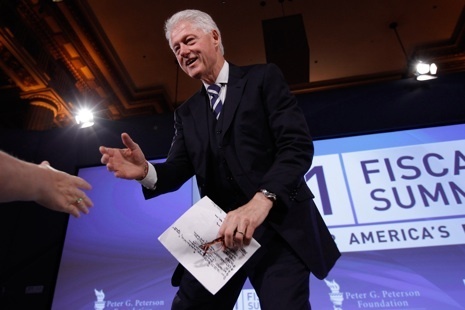
Pros: Deeply interested in the issues and has the stature to lead the Bank in a fresh direction. Popular abroad. Likes attending boring conferences in foreign countries.
Cons: A former President might not be the person to assuage overseas complaints about U.S. Administrations controlling the Bank. Lingering concerns about his health. Would Hillary let him do it?
Luiz Inácio Lula da Silva: Odds, 25/1

Pros: Served as president of Brazil from 2003 to 2010. Led the fifth-biggest country in the world to a period of unprecedented prosperity. Introduced social programs that reduced poverty and reduced inequality.
Cons: He's not American. He doesn't speak good English. He was recently diagnosed with throat cancer.
Tony Blair: Odds, 25/1
Pros: Interested in poverty issues: was a strong supporter of the Millennium Goals. Possible compromise candidate: not American but has strong ties to U.S. More popular around the world than in his native U.K.
Cons: Support of Iraq war may revive memories of Paul Wolfowitz's disastrous tenure. Might not forsake lucrative consulting business. Would David Cameron back him? (Last year, Cameron blocked Gordon Brown's efforts to get the top job at the I.M.F.)
Stan Fischer: Odds, 50/1
Pros: Eminent economist who knows the issues. Former chief economist at the Bank, also held senior jobs at I.M.F. U.S. citizen but was born in Africa, in what is now Zambia.
Cons: Low public profile. Getting on a bit—he's sixty-eight. Israel connection may put off some Bank members. (He is currently Governor of the Bank of Israel.)
Robert Rubin: Odds, 50/1
Pros: Has long expressed interest in issues of inequality and economic growth. As former co-head of Goldman and chairman of Citigroup, he knows a bit about integrating geographically scattered operations and overcoming cultural differences. May be looking for a way to refurbish his image.
Cons: At seventy-four, he may no longer have the enthusiasm and energy necessary for the job. Same issue with flying commercial as HRC. What did he do to earn that hundred-million-dollars-plus at Citi?
Bono: Odds, 100/1

Pros: Long history of interest in Bank-related issues. Has his own Washington-based charity devoted to reducing global poverty: One. Accustomed to tripping around the world.
Cons: An Irish pop star is probably not what the Brazilian government, Oxfam, and others have in mind when they call for a non-American to be chosen. Dublin accent is sometimes tough to understand. Could balk at taking off his sunglasses and leather jacket.
Manhoman Singh: Odds, 150/1
Pros: As finance minister and then as prime minister of India, has opened up and liberalized the world's second-largest country. Has overseen a period of rapid economic growth. Experience in international organizations: once worked at United Nations.
Cons: Age and health issues. He's eighty years old and has had numerous heart operations. Plus, his government has recently been mired in corruption scandals.
Vladimir Putin: Odds, 500/1
Pros: Might be looking for a graceful exit from Moscow. Expert in the fashionable "state capitalism" model of economic development. As a former Soviet apparatchik, knows how to deal with dysfunctional bureaucracies.
Cons: Would probably surround himself with equally scary Russians. Unlikely to take advice from the White House. Questionable exemplar of the "good governance" that the Bank puts much stress on.
This post was updated to include Tony Blair and Stan Fischer.
Photographs of Geithner and Hillary Clinton by Pete Souza/The White House; Bill Clinton and Bono by Chip Somodevilla/Getty Images; Lula by Jeff Zelevansky/Getty Images.
February 14, 2012
The Santorum Surge: How Seriously Should We Take It?

When I was a young reporter, one of my mentors, the late Anthony Bambridge, a Fleet Street editor of the old school who started out at the Observer under David Astor and spent most of his career at the Sunday Times, offered me some advice on how to produce arresting copy: treat the serious subjects trivially and the trivial subjects seriously.
This somewhat paradoxical approach to journalism, which for some reason I hadn't picked up during my time at the Columbia J-School, remains a sound one. However, it does presume an ability to distinguish between what is serious and what is trivial, which is sometimes lacking. Take Rick Santorum: Is he a serious candidate, who is therefore ripe for mockery? Or is he a trivial character, ripe for building up?
Until his victories in Colorado, Minnesota, and Missouri, many supposed experts viewed Santorum's campaign as a curiosity or ignored it completely. Now things have completely turned around. The newspapers and political sites are full of articles treating Santorum as a credible contender. I've even written one myself. Last week, I pointed out that his message of social conservatism and economic populism clearly resonates with large parts of the Republican base, and also with some independents and Reagan Democrats.
All the evidence suggests that Santorum's campaign still has real momentum. According to the latest New York Times/CBS News poll, which was released this morning, he is now leading Romney nationally among Republican primary voters by thirty per cent to twenty-seven per cent—a statistical tie. This finding follows two more national surveys released on Monday, which produced very similar results. The latest Gallup tracking poll had Romney leading by thirty-two per cent to thirty per cent; a poll from the Pew Research Center showed Santorum edging Romney by thirty per cent to twenty-eight per cent.
All of these surveys suggest that the Republican primary is now essentially a two-person showdown, with the other candidates trailing badly. State surveys are also swinging in Santorum's favor. In Michigan, where both the main candidates are campaigning heavily ahead of the February 28th primary, a poll released yesterday showed Santorum surging to a fifteen-point lead over Romney: thirty-nine per cent to twenty-four per cent. Even in California, which doesn't vote until the start of June, a new survey from SurveyUSA shows that Santorum is now statistically tied with Romney.
To be sure, the polls are volatile, and Santorum hasn't yet been fully subjected to the Romney campaign's attack machine, which over the next two weeks will be spending a lot of advertising dollars to portray him as a corrupt Washington insider who lacks executive experience. For now, though, he is clearly on a roll. If he were to win in Michigan, where Reagan Democrats and others who aren't registered Republicans can nonetheless show up and vote, it would change the entire complexion of things going into Super Tuesday.
Apart from anything else, this makes Santorum a godsend for reporters covering the Republican primaries. His surge keeps going what has already proved to be a bizarre and eventful story. But Santorum as a serious contender for the Presidency? That is where I hop off his bandwagon.
My reasoning is straightforward and perhaps a bit too conventional. Santorum is essentially an ultra-right-wing protest candidate. America is essentially a centrist or center-right country. Therefore, his potential is limited. In times of economic distress, or whenever a national-security crisis arises, the audience for extremist views expands quite a bit—c.f. the rise of the neo-cons and the Tea Party—but surely not to the extent of the country at large supporting a religious zealot and armchair militarist of Santorum's stripe. (For one thing, think of the gender gap he would have to overcome.) And with the economy improving, the market for political extremism is shrinking anyway.
If Santorum were to be nominated, the odds are that Obama would win in a landslide. For that reason, at least for now, I will continue to reassure myself that he is ultimately a trivial candidate, which, according to the Bambridge school of journalism, justifies more "Rick is for real" articles. But what if he really is for real? What if America has turned into such a divided and embittered country that a figure like Santorum can mount a credible bid for not just the nomination but the Presidency? What would that say about us?
I'm only asking. Santorum has already upended a good deal of conventional wisdom. And, as a journalist, you never want to get so wedded to one particular theory that it blinds you to the evidence before your face. That was another piece of advice from Bambridge.
Photograph by Cal Sport Media/AP Photo.
John Cassidy's Blog
- John Cassidy's profile
- 56 followers



